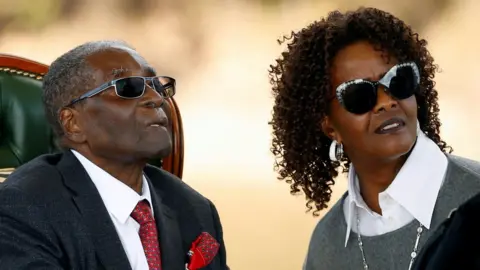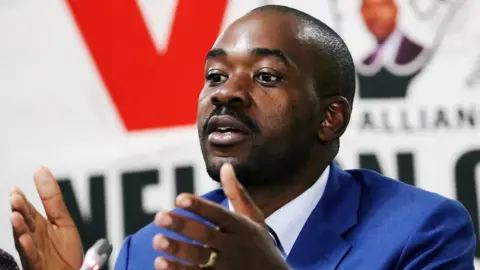Zimbabwe election: Mugabe refuses to back successor Mnangagwa
Zimbabwe's ex-president Robert Mugabe says he will not vote for his successor and former ally in Monday's elections.
In a surprise speech, Mr Mugabe said he could not support Zanu-PF's Emmerson Mnangagwa after being forced from office by the "party I founded".
"I cannot vote for those who tormented me," he said. He added that he had not chosen among the other candidates but wished the main opposition leader well.
Mr Mugabe was ousted last year after almost four decades as leader.
Mr Mnangagwa's main challenger is the candidate from the opposition Movement for Democratic Change (MDC), Nelson Chamisa.
When asked by the BBC's Fergal Keane if he would like to see Mr Chamisa win, Mr Mugabe, 94, indicated that he was the only viable candidate.
Allow Twitter content?

In response to the comments, Mr Mnangagwa accused his former boss of making a deal with the opposition.
"It is clear to all that Chamisa has forged a deal with Mugabe, we can no longer believe that his intentions are to transform Zimbabwe and rebuild our nation," he said.
What else did Mr Mugabe say?
Speaking from his home in the capital, Harare, on Sunday, the former president again said he had been "sacked" as part of a military coup and that he left office in order to "avoid conflict".
"I hope the choice of voting tomorrow will throw, thrust away the military government and bring us back to constitutionality," he said.
 Reuters
Reuters  Reuters
ReutersMr Mugabe also denied that, as president, he had planned to hand the leadership to his wife, Grace, saying it was "utter nonsense".
He suggested that ex-defence minister Sydney Sekeramayi should have taken over.

A new Zimbabwe
By Pumza Fihlani, BBC News, Harare
Robert Mugabe has hardly been seen or heard from since his unceremonious removal from the presidency last November. If Sunday's surprise news conference is anything to go by, the former statesman has not forgiven those who took his Zimbabwe away from him.
At times he appeared frail, but his words were cutting. He spent much of his address criticising the current government led by Mr Mnangagwa, once a close ally. He believes President Mnangagwa's rise to the top job was unconstitutional.
Perhaps the strongest sign of their fractured relationship was the revelation that he would not be voting for Zanu-PF, the party he helped found.
But does Mr Mugabe still matter here in Zimbabwe? Not in any way he would appreciate; there is an overwhelming sense especially from young people that he is out of touch with the challenges facing Zimbabweans today. And while Zimbabwe might owe its independence to Mr Mugabe, there's a new Zimbabwe waiting to be born.

What is happening on Monday?
More than five million Zimbabweans are preparing to go to the polls to vote in presidential, parliamentary and local elections. There are 23 candidates on the presidential ballot.
The country is expecting a high turnout of first-time voters, where the youth vote is expected to be key, with almost half of those registered being under the age of 35.
The impoverished country, which has known decades of repressive rule, faces severe economic challenges.
These include issues of investment, education, healthcare and jobs - some estimates suggest that the unemployment rate in Zimbabwe is as high as 90%.
The frontrunners in addressing these challenges are Zanu-PF's President Mnangagwa, 75, and the MDC's Mr Chamisa, 40.
An opinion poll last week saw the MDC close the gap with Zanu-PF from 11 percentage points to three, with 20% of voters undecided. It was only the second of two opinion polls.

Election in numbers
- 5,635,706 people have re-registered to a new voters' roll; the opposition still has doubts about its accuracy
- 43.5% of registered voters are under 35
- 10,985 polling stations
- 16 years since EU and US observers were allowed to monitor elections
